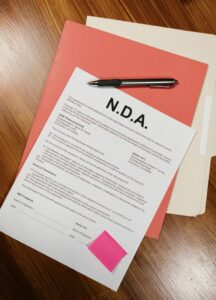It starts with an idea. A name that clicks. A logo, a domain, maybe even some business cards. You run a quick online search, find that the name’s “available,” and lock it down—thinking the path is now clear to build your brand.
But what if we told you that name might not actually be yours?
In today’s marketplace, just because a name looks available doesn’t mean it’s legally protected. And skipping the trademark registration process could leave your entire business exposed. That’s not just speculation—it’s a real, common legal trap entrepreneurs fall into. According to Forbes, more startups face trademark disputes than they expect, and many lose thousands—or their entire brand—fighting claims they didn’t see coming.
Let’s break this down.
The “Available” Illusion: Why Search Engines Aren’t Legal Clearance
Seeing your business name pop up as available on GoDaddy or social media isn’t the same as owning it. A domain name or Instagram handle is just that—a username, not a legal right.
Under U.S. trademark law, trademark rights are based on use and registration. That means another business—perhaps one in a different state or industry—may already hold common law rights to your exact name. Worse, a registered federal trademark could block your use entirely, no matter how clever or local your branding feels.
We’ve seen plenty of disputes arise this way, especially for our business clients in Alexandria and Fairfax, Virginia. It often comes down to a gap between what’s technically available online and what’s legally defensible in court.
Why a Trademark Isn’t Just a Formality
Some founders skip trademark registration, assuming it’s just paperwork. That assumption can turn into a costly misstep.
Registering a trademark with the U.S. Patent and Trademark Office (USPTO) creates nationwide protection—granting the holder exclusive rights to use that name in connection with specific goods or services. Without that protection, your brand is vulnerable to:
- Cease-and-desist letters from more established businesses
- Forced rebranding after months (or years) of public use
- Legal liability for damages if you’re found to be infringing
- Missed licensing or franchising opportunities due to weak IP
This type of oversight can ripple into other areas of operation—especially during mergers, acquisitions, or partnership deals.
The Risk of Skipping Legal Counsel
Too many business owners make naming decisions without legal guidance. A Google search might seem like enough, but it rarely uncovers deeper risks—like phonetic similarities, prior use in foreign markets, or conflicting logos that could trip a “likelihood of confusion” test at the USPTO.
And once a brand has grown in visibility or value, these risks multiply.
As a litigation attorney in the Washington, DC area, we’ve dealt with trademark conflicts where one party unknowingly built a successful brand on top of someone else’s mark. These cases can escalate quickly into federal litigation—draining resources and putting the business itself in jeopardy.
That’s why early-stage legal input is more than preventative; it’s strategic.
Trademark Disputes in the Real World: What Actually Happens?
Let’s say your local café, “Perk District,” opens in Arlington. You’ve got signage, a website, and customers. But then, a national chain with a similar name—“Perq District™”—sends a cease-and-desist letter citing their federal trademark.
You’re shocked. You had no idea. But you still might have to:
- Remove all branding from physical locations
- Shut down your website and email addresses
- Relaunch under a new name with zero brand equity
Even if you fight and win (which isn’t easy), the process could take months. And if you’re already locked into a lease or dealing with local zoning, working with a real estate attorney suddenly becomes mission-critical, too.

The Domino Effect: Real Estate, Licensing, and Growth
Trademark issues don’t exist in a vacuum. For companies looking to scale, a weak brand foundation can derail real estate deals, investor relations, and even vendor contracts.
We’ve worked with businesses who were mid-negotiation on retail spaces—then hit a branding conflict that tanked the deal. In some cases, their competitor used the name conflict to challenge their licensing applications at market entry.
Having an experienced business lawyer in the Washington, DC area on board isn’t just about defending disputes—it’s about avoiding them altogether.
But What If I’m a Local Business? Do I Still Need a Trademark?
Yes—and maybe more than most.
Local businesses often believe they’re safe because their brand reach is geographically limited. But trademark rights don’t stop at the city line. A business in New York holding a federal trademark can still block a similar-named salon in Virginia—even if their paths don’t physically cross.
The rise of SEO, online delivery, and digital advertising blurs traditional boundaries. Your local presence is still a part of the national marketplace. That’s something business attorneys in Northern Virginia and beyond are increasingly helping business owners navigate.
Common Trademark Myths—Busted
Myth 1: “I’m too small to be a target.”
Reality: Small businesses are often the most vulnerable because they lack the legal resources to fight back.
Myth 2: “I’ve been using the name for a while, so I’m safe.”
Reality: Prior use helps, but it doesn’t override a registered federal trademark. Use without registration only gives you common law rights—often limited in scope.
Myth 3: “I’ll deal with it when I grow.”
Reality: Waiting can make the problem worse. The more you invest in a brand, the more expensive it is to undo.
Working with a business lawyer in Northern Virginia early on can help sort myth from law—and give you a roadmap that’s built to last.
The Real Value of Experienced Counsel
At Jabaly Law, we don’t just help you react to trademark problems—we help you anticipate them. Our approach is rooted in practical experience, whether we’re navigating the fine print of licensing deals or digging through prior registrations to identify risks before they become disputes.
As an experienced business lawyer in Falls Church, VA, our focus isn’t just what the law says—it’s how it’s applied, and how we can position your business to succeed within it.
That “feel” for a case—earned through years in both litigation and corporate settings—isn’t something you get from a generic online template. It’s a skill set built for judgment calls: when to push, when to pivot, and when to protect your brand before you even need to.
When to Trademark (and When to Rethink Your Brand)
If your business name is tied to a product, a public-facing service, or even a personal brand, trademark registration is worth serious consideration. But it’s not just about filing paperwork—it’s about choosing the right classification, checking for conflicts, and deciding if your name is truly distinctive enough to hold legal weight.
Sometimes, after a thorough review, the smart move is to rebrand early—before you’ve poured money into signage, packaging, or ads.
That’s the kind of decision that’s hard to make without an experienced business lawyer—one who’s not just reviewing names but evaluating your entire legal exposure.
Final Thoughts: It’s Not Just About Ownership—It’s About Leverage
A registered trademark doesn’t just give you peace of mind. It gives you leverage. It allows you to:
- License your brand to partners
- Sell your business with more value
- Enforce your rights if challenged
- Signal credibility to investors, clients, and vendors
And as any litigation attorney will tell you, having a strong trademark is often the first step toward a strong legal defense.
Your business name may feel like yours. But only the right legal steps make it so.
Secure Your Brand with Jabaly Law
At Jabaly Law, we combine strategic insight with real-world experience to help you protect what you’ve built. Whether you need help with trademarks, real estate disputes, or general legal services for businesses in Washington, Virginia or beyond, our goal is the same: protecting your business with foresight, not just reacting in the moment.
Explore our services, connect with an experienced business lawyer, or call now to schedule a consultation.



















